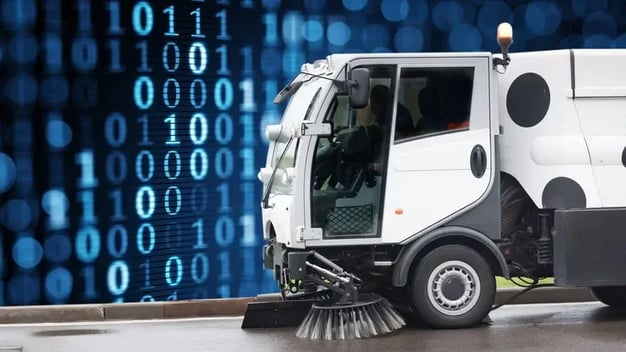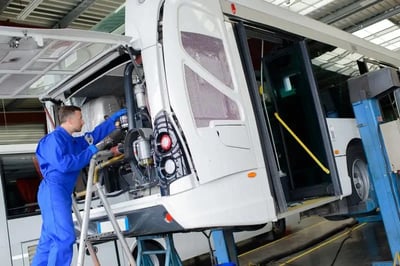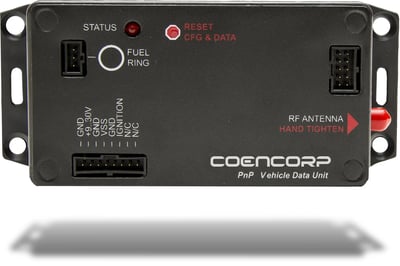
What if we told you that you could, on occasion, have your cake and eat it too?
In today's article, we discuss vehicle data collection, the critical role it plays in your fleet's efficiency, and how to get it done automatically and without paying recurrent, per-vehicle fees.
But in order to fully appreciate the importance of accurate and timely engine data to fleet efficiency, we should first consider preventive maintenance (PM) and its role in achieving superior fleet management outcomes.
importance of commercial and industrial fleet preventive maintenance
If you’ve ever had to have your car towed to the repair shop due to an unexpected breakdown, you know how expensive (and disruptive!) such a circumstance can be. It’s always more cost-effective to properly maintain a vehicle than it is to fix it once something goes wrong. This self-evident calculus is greatly amplified still as the number of vehicles involved rises from just one to dozens, hundreds, or thousands of moving assets, as we have in many commercial and industrial fleets.
In very brief, a fleet preventive maintenance program consists of periodic service, inspections, and vehicle repairs. Running a successful fleet PM program may be challenging, but it is well worth the effort; PM duties include tasks like vehicle inspection, lubrication, adjustment, cleaning, testing, repair, and/or component replacement. At the heart of fleet PM programs, what drives them, is a specific set of data which generally stand as proxies for vehicle usage: time, mileage, engine hours, or amount of fuel consumed.
Working in concert, these data and procedures greatly help fleet managers prevent or mitigate vehicle-related problems on a proactive rather than reactive basis. This approach provides several benefits which you, a competent fleet manager, are no doubt aware of. Here we list some of the most significant, though there are many more.
- Direct monetary savings: It is an established fact that preventive maintenance interventions are innately less costly than the downstream corrective ones which they prevent. Just compare the cost of, say, replacing brake pads vs dealing with rotor or calliper damage.
- Avoidance of breakdowns in the field: Consider the escalation of expenses that occurs when a vehicle fails on the job, forcing you to deploy resources to remove it from service, send a replacement to pick up where things left off, incur delays in completing the tasks the vehicle was involved in (possibly using overtime labor to make up for lost time), suffer degradation in service quality to your clients, and make an expensive corrective repair in the future—instead of what could have been a routine PM procedure. It's every fleet manager's worst nightmare.
- Higher availability through reduced vehicle downtime: Preventive maintenance and regular service help identify potential problems before they become real ones. A well-maintained fleet will increase equipment availability, reducing the time spent inactive and increasing your profitability.
- Longer useful vehicle life: in the longer term, preventive maintenance programs can help extend the overall lifespan of your vehicles and improve their resale value.
- Increased safety: Importantly, you should see an increase in overall efficiency and better compliance with safety and health regulations.
Having stated that we must bear in mind that vehicle usage is the main element in establishing PM schedules and that conventional manual methods of collecting vehicle data are laborious, time-consuming, and error-prone. Indeed, manual vehicle data gathering is not only time-consuming but also expensive to maintain and update—a significant problem for any company in today's competitive environment.
You know there's a better way.
Automated Engine Data Capture With Fleet Telematics
When thinking about automating data collection of fleet assets, vehicle telematics or sensor-augmented AVL immediately emerge.
This set of modern technologies (sometimes referred to as GPS fleet tracking or GPS fleet management systems) would be a boon to any fleet manager. It offers insights into vehicle use, accountability, efficiency, and safety. It can help to manage and improve various key performance indicators such as speeding, poor routing, excessive idling, and vehicle failures. And more to the point, it also helps track the required data for preventive maintenance planning.
Still, while you undoubtedly appreciate the wide capabilities of these complex fleet management systems, they may be overkill for your requirements. And then there's their cost: depending on several factors, including features, contract length, fleet size, et al., most GPS/telematics/AVL fleet tracking systems will set your company back an average of $25 to $45 per-vehicle, per month.
If your primary concern is preventive fleet maintenance, that may well be a tough business case to make—or perhaps even afford.
Indeed, the only vehicle data you will need to feed to a first-rate PM program boils down to the following:
- Total mileage
- Total engine hours
- Distance travelled since a certain date
- Engine hours since a certain date
- Total fuel consumed
- Fuel consumed since a certain date
- Engine fault codes
And if you could have your way, you just might wish for some extra readings that aren't accessible from most vehicles, not even through manual data collection:
- Idling data—save money on fuel by monitoring and reducing idling, save the environment by lowering your fleet's emissions, and save on engine wear. And, of course, sophisticated fleet managers know that vehicles that routinely idle more (ambulances, police vehicles, et al.) may benefit from a special maintenance schedule. Hence, obtaining engine idling data gives your fleet a competitive edge:
- total idle time
- total short idle (configurable)
- total sleeper idle (configurable)
- short idle time since a certain date
- sleeper idle time since a certain date
- Power Take-off time (PTO)—essential to the effective preventive maintenance of your PTO-powered compactors, pumps, or generators is the accurate tracking of your fleet's power take-offs, i.e., their total operating hours. This should be self-evident. But monitoring PTO will provide non-maintenance-related benefits important to your bottom line as well: precise job costing, increased safety, and fuller fuel tax recovery, for instance.
At this point, it might seem like your only options are either tedious, inaccurate manual data collection or expensive vehicular telematics.
However, there's a better way.
The SM2 Vehicle Data Unit: Affordable, Automated Engine Data Capture
One key aspect of gathering vehicle data for PM that's often overlooked is that the data doesn't have to be real-time. Knowing a unit has reached one of the maintenance triggers while it's on duty in the field isn't all that useful. In most cases, collecting this information whenever the vehicle enters or drives through your premises is sufficient. To that end, expensive GPS units aren't required since drive-by data capture can accomplish this task easily, reliably, and cost-effectively.
An example of such a solution is Coencorp's SM2. Regarding preventative fleet maintenance, SM2 has you covered: advanced yet easy-to-use PM software complemented by a Vehicle Data Unit (VDU) that won't demand recurring per-vehicle fees.
The VDU is small, rugged, and easy to install. It's plug-and-play: connect it to the vehicle's diagnostics port and add its ID number to the vehicle's profile in your SM2 software, and you're done—no device programming or configuration required. Any number of SM2 Data Collector Units strategically placed within your facilities will collect all of the necessary vehicle data automatically whenever a vehicle drives by.
Note that although the VDU is native to the SM2 integrated fleet management system, you can also use it stand-alone. Meaning that if you already have a fleet maintenance management system in place, SM2's integrated data exchange engine will transfer the vehicle's data to your software in real-time (if your system supports web services) or on a preset timetable through batch export. All that's needed is for the vehicle to pass by within a few hundred feet of an SM2 Data Collector Unit.
Conclusion: Automated Vehicle Data Capture That Doesn't Break the Bank
The preventive maintenance program of a commercial or industrial fleet is only as strong as its weakest link. And without automated vehicle data collection, erroneous or incomplete vehicle data will likely be that weak link.
As a savvy fleet manager, you recognize that running an effective PM operation entails automating that set of critical vehicle data. You might even have concluded that paying the monthly per-vehicle fees associated with GPS/telematics systems is the only option to achieve that goal.
We're here to inform you that SM2's Vehicle Data Units from Coencorp deliver the best of both worlds: automatic vehicle data collection—and transmission to third-party systems as necessary—and no recurring per-vehicle charges. Use them to feed your fleet's PM programs and keep it running smoothly without breaking the bank.
The VDU is a mature, established product with decades of real-world experience and thousands of installs on fleet vehicles across various industries. It is ideal for fleet managers seeking to improve their preventive maintenance program.
Subscribe to Fleeting Thought and be notified as soon as a new fleet management-focused blog is published.
